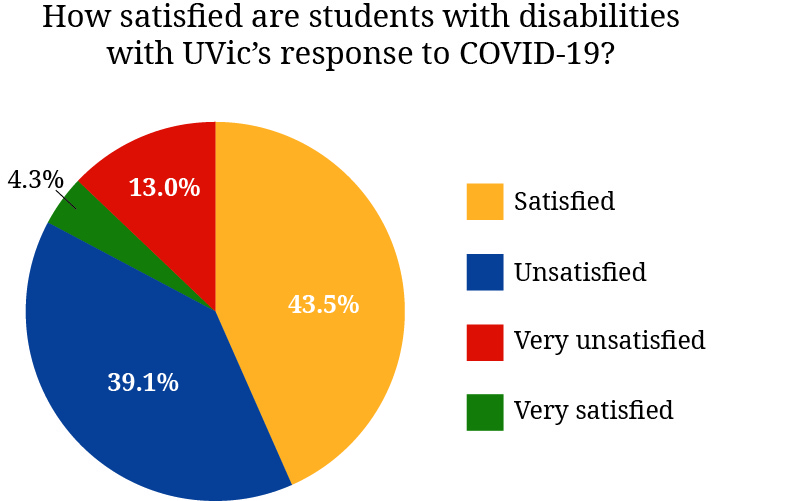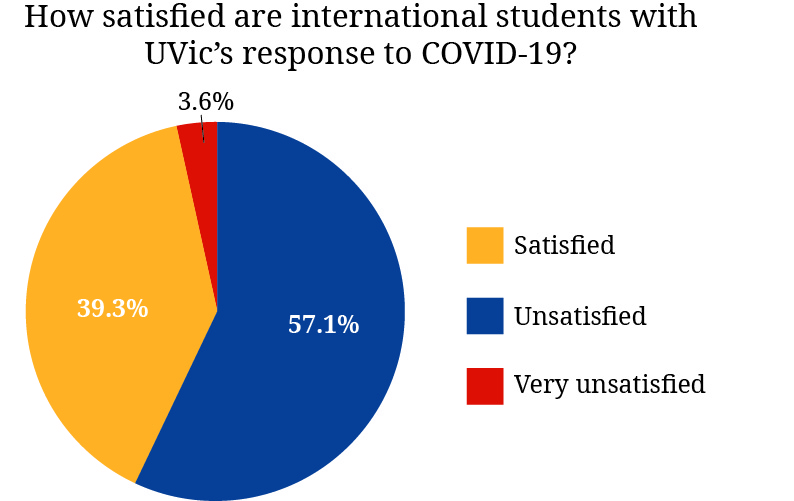408 students responded to questions about online classes, affordability, and UVic’s COVID-19 response
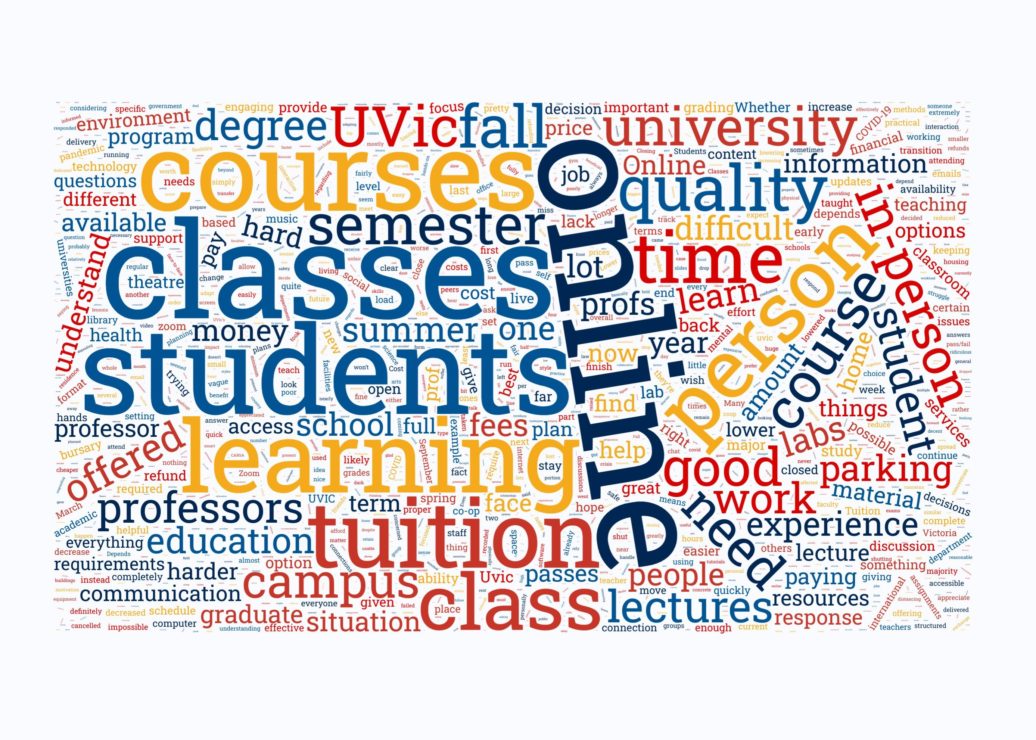
As summer classes progress and B.C.’s COVID-19 case count trends downwards, students finally have time to process the historic changes the pandemic brought for UVic.
For the first time in its history, the university cancelled in-person instruction for the end of the spring semester and enacted an optional pass/fail grading policy.
In a short set of questions, the Martlet asked students how they’ve felt about topics such as online instruction, affordability, and UVic’s response to COVID-19. 408 people responded to our survey from May 14 – 24, which was shared on the Martlet’s social media. Here are the responses.
Only 2.5 per cent of students feel online classes are the same quality as in-person ones
In May, UVic announced classes will be predominantly online in the fall. UVic’s President Jamie Cassels has repeatedly said that online classes will provide the same quality of education as in-person ones.
But the vast majority of UVic students disagree. Almost 80 per cent of students answered “no” when asked “do you feel online classes are the same quality as in-person ones?”
Only 2.5 per cent of students answered “yes” to the same question.
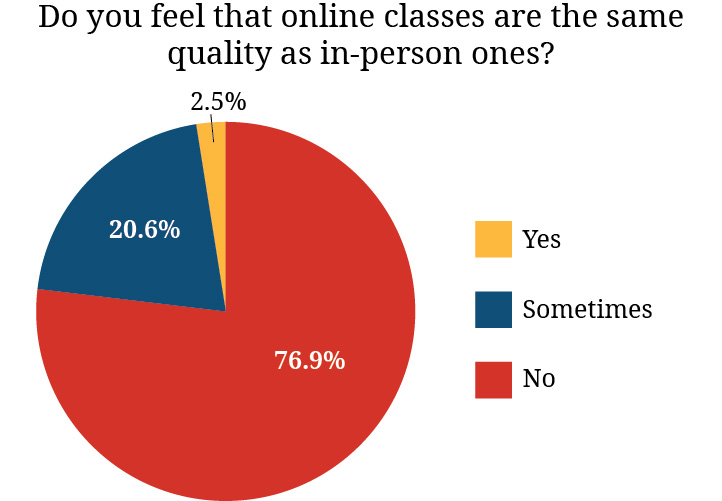
In the survey, students were given space to elaborate on their answers, and many students spoke about the challenges of online classes.
Specifically, students said that online instruction doesn’t allow for the same opportunities to connect with professors. Students in fine arts, theatre, music, and lab-based degrees were especially worried about online instruction.
“My current professors are doing a great job with what they have,” an international student said. “I am learning, but I am very drained and I am not getting the interactive and social component.”
Students also expressed concern about accessibility issues with online learning. Some said they do not have access to appropriate space, wi-fi, or technology to complete online classes.
“Not all students have the ability to attend class virtually,” a law student said. “Lack of the proper technology or appropriate internet access, lack of child-care, and the physical space to sit quietly uninterrupted all pose significant barriers to creating an equitable solution. Personally, I live with several roommates in a very small basement suite and it is a significant challenge to juggle conflicting video calls.”
Some believe their professors have not received adequate training in online instruction — in place of lectures, students have received plain-text notes, slides, and reading assignments.
“Teachers may adopt methods that do not convey information in the most effective manner,” said one woman. “One prof last semester used speech-to-text for his lecture, [they] ended up with 15 pages of block text notes for each lecture.”
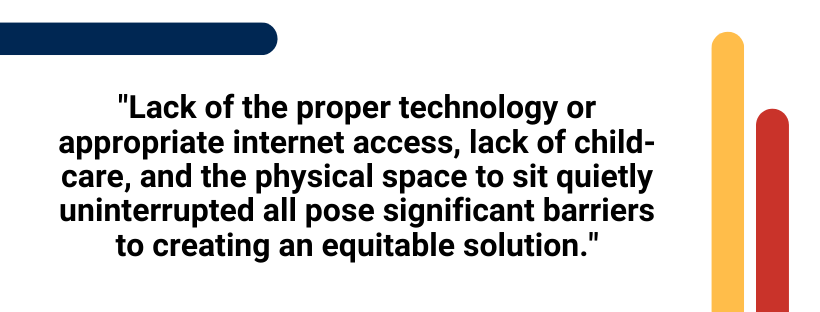
20 per cent of students indicated that online classes were the same quality as in-person courses “sometimes.” In their comments, these students emphasized the importance of professors structuring their online classes well.
The university has said they will continue to provide resources for instructors to deliver online education. For instance, UVic’s newly released “Learn Anywhere” site offers online learning resources for students.
Despite challenges, most students plan to take a full-time courseload
There has been some speculation that, due to COVID-19, enrollment numbers will drop in the fall. For instance, the Canadian Federation of Students found that “30 per cent of returning and new students might change their plans about enrolling at a post-secondary institution in the fall.”
This was not the case for the UVic students who responded to the survey. 79.6 per cent of students surveyed plan to take three or more classes, and only 4.2 per cent intend to take a semester off. Many of those taking a full course load reported that it was a course requirement or that they wanted to graduate on time.
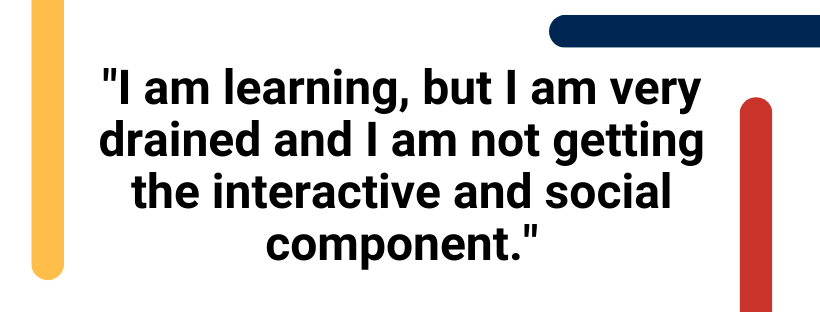
The 12.4 per cent of students who were still unsure of their plans discussed affordability concerns and whether or not their classes were in-person as factors for deciding their university plans going forward. Three students said they plan to transfer universities for a semester to reduce costs.
When asked what contributed to their decisions about course load, students expressed worries about the quality of online classes and cost of tuition.
“Tuition fee, tuition fee, and most importantly, tuition fee,” one student answered.
Students give mixed reviews of UVic’s COVID-19 response
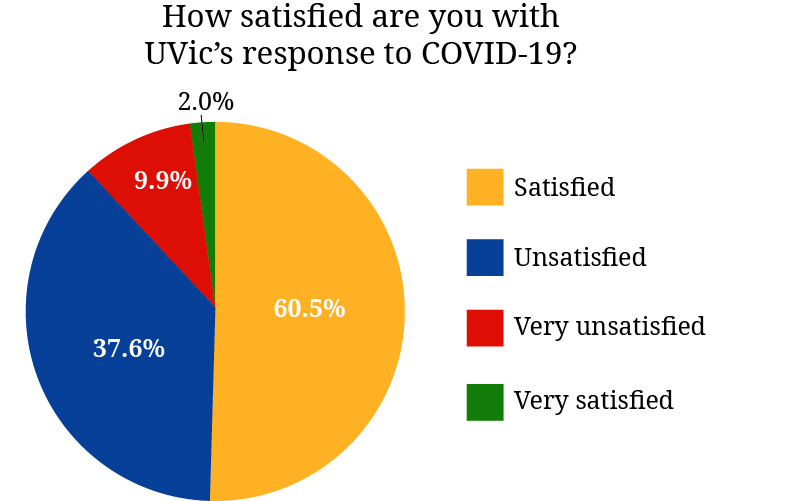
The majority of students were satisfied with UVic’s response to COVID-19. Two per cent were very satisfied and 10 per cent were very unsatisfied, with 60.5 per cent of students satisfied and 37.6 per cent of students unsatisfied.
Students were also asked to indicate what UVic did well, and what they could do better.
Many students noted that the university acted quickly in halting in-person instruction at the appropriate time, and providing alternative grading options. Some also indicated they were impressed by UVic communicating their plans early — especially in regards to classes being online in the summer and fall semesters.
“The leadership reacted quickly and were very adaptable as the crisis unfolded,” a student said.
In terms of what UVic could improve on, students reiterated that accessibility issues in online learning, a lack of mental health support, and financial matters — like not receiving refunds for annual parking passes, or not hearing back from the COVID-19 emergency bursary — were areas the university could strengthen.
A couple of students recommended that UVic set up a chat line on their website for students to ask questions or be directed to the appropriate supports.
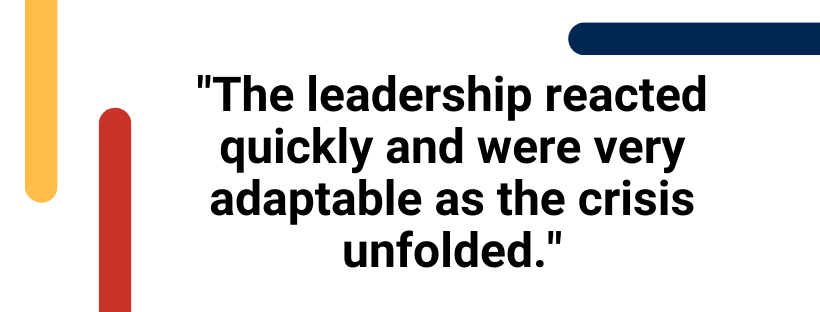
Tuition was the most common concern — 59 per cent of those surveyed said COVID-19 has affected their ability to afford tuition in the fall. Of those who elaborated on UVic’s response, 101 students believe tuition should be lowered. Cassels remains adamant that the university will not lower tuition.
“They did react and adapt quickly [to COVID-19] which was good, but the fact that they are expecting the same tuition for online is a slap in the face,” an international student said.
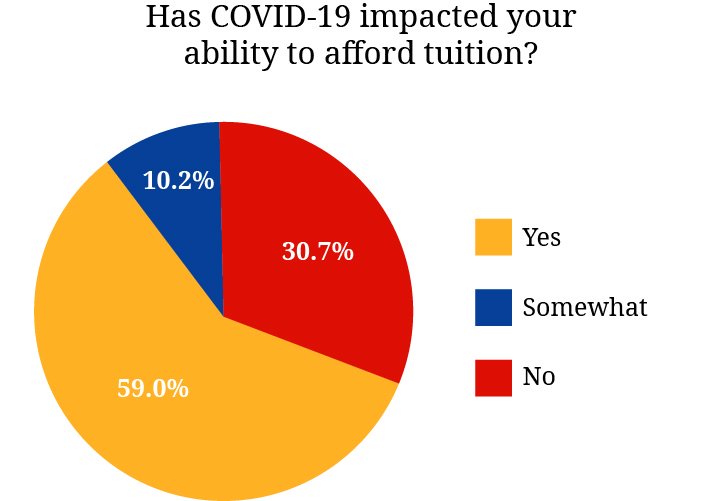
Communication is key
Some students find the emails they receive from UVic give them more questions than answers. Of the 101 students that mentioned communication in their feedback for UVic, 71.4 per cent of them spoke negatively of it.
“The vagueness and irregularity of the announcements from President Cassels has not been reassuring at all,” a student remarked. “I think that the frontward-facing staff, like those in residences and academic advisors are really trying their hardest and their work is commendable.”
Others expressed that the university should give explicit and simple answers to student’s questions and concerns.
“A simpler email that states that for example, the school has closed for the term, or that classes in the fall are not running in person, would be far more effective than tangling emails with unnecessary language,” another student said. “I wouldn’t expect a student whose first language is not English to understand these confusing emails.”
Respondents to the Martlet’s survey expressed that they feel the university’s transparency and communication are still a work in progress.
“I don’t feel that the university is operating with the students’ best interests at heart,” said one student. “And that it’s operating solely as a business — seeking to protect its own gains without investing in the students and asking what might enhance their education.”
With files from Mary Heeg.



